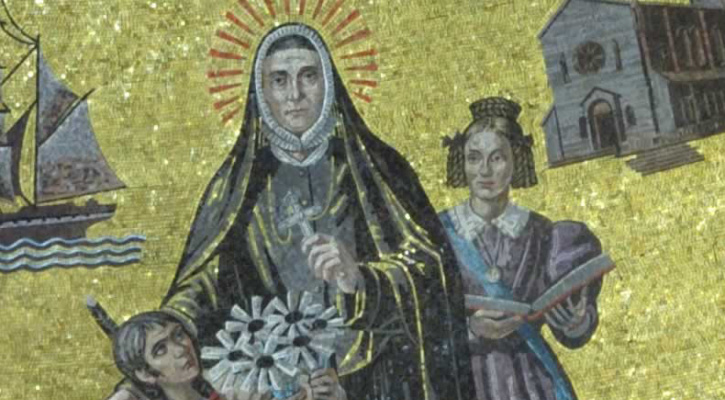Saint Rose Philippine Duchesne, Saint of the day 20 November

History of Saint Rose Philippine Duchesne
Born in Grenoble, France to a family that was among the new rich, Rose learned political skills from her father and love for the poor from her mother. The dominant feature of his temperament was a strong and courageous will, which became the material - and the battlefield - of his holiness. He entered the convent of the Visitation of Mary at 19 and remained despite the opposition of the family. When the French Revolution broke out, the convent was closed and she began caring for the poor and the sick, opened a school for homeless children and risked her life by helping the underground priests.
When the situation cooled, Rose personally rented the former convent, now in ruins, and tried to revive her religious life. However, the spirit was gone and soon only four nuns remained. They joined the newly formed Society of the Sacred Heart, whose young superior, Mother Madeleine Sophie Barat, would be her lifelong friend.
In a short time Rose was superior and supervisor of the novitiate and a school. But ever since she had heard tales of missionary work in Louisiana as a child, her ambition was to go to America and work among the Indians. At 49, he thought this would be his job. With four nuns, she spent 11 weeks at sea en route to New Orleans and another seven weeks on the Mississippi in St. Louis. He then encountered one of the many disappointments of his life. The bishop had nowhere to live and work among Native Americans. Instead, he sent her to what she sadly called "the most remote village in the United States," St. Charles, Missouri. With distinctive determination and courage, she founded the first free school for girls west of the Mississippi.
Although Rose was as tough as all the pioneer women of the wagons rolling west, cold and hunger drove them out - to Florissant, Missouri, where she founded the first Indian Catholic school, adding more to the territory.
“In her first decade in America, Mother Duchesne suffered virtually all the hardships the frontier had to offer, except the threat of the Indian massacre: poor housing, scarcity of food, clean water, fuel and money, forest fires and burning fireplaces. , the vagaries of the Missouri climate, the cramped housing and deprivation of all privacy, and the rudimentary manners of children raised in a harsh environment and with minimal training in courtesy ”(Louise Callan, RSCJ, Philippine Duchesne).
Eventually, at the age of 72, retired and in poor health, Rose fulfilled her lifelong wish. A mission was established in Sugar Creek, Kansas, among the Potawatomi and she was brought with her. Although she could not learn their language, they soon called her "Woman-Who-Always-Prays". While others taught, she prayed. Legend has it that Native American children sneaked after her as she knelt and scattered pieces of paper on her dress, and returned hours later to find them undisturbed. Rose Duchesne died in 1852, at the age of 83, and was canonized in 1988. The liturgical feast of St. Rosa Philippine Duchesne is November 18.
Reflection
Divine grace channeled Mother Duchesne's iron will and determination into humility and altruism and a desire not to be made superior. However, even saints can get involved in stupid situations. In an argument with her about a small change in the shrine, a priest threatened to remove the tabernacle. He patiently allowed himself to be criticized by the younger nuns for not being progressive enough. For 31 years, she has held the line of fearless love and unshakable observance of her religious vows.